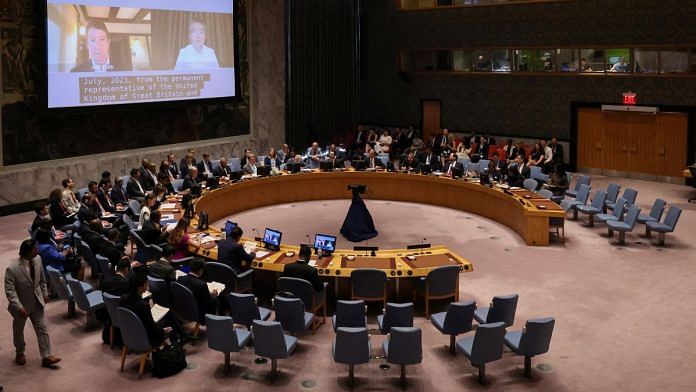United Nations: The United Nations Security Council held its first meeting on artificial intelligence on Tuesday where China said the technology should not become a “runaway horse” and the United States warned against its use to censor or repress people.
Britain’s Foreign Secretary James Cleverly, who chaired the meeting under Britain’s July presidency of the body, said AI will “fundamentally alter every aspect of human life.”
“We urgently need to shape the global governance of transformative technologies because AI knows no borders,” he added after saying that AI could help address climate change and boost economies. But he also warned that the technology fuels disinformation and could aid both state and non-state actors in a quest for weapons.
The 15-member council was briefed by U.N. Secretary-General Antonio Guterres, Jack Clark, co-founder of high-profile AI startup Anthropic, and Professor Zeng Yi, co-director of the China-UK Research Center for AI Ethics and Governance.
“Both military and non-military applications of AI could have very serious consequences for global peace and security,” Guterres said.
Guterres backs calls by some states for the creation of a new U.N. body “to support collective efforts to govern this extraordinary technology,” modeled on the International Atomic Energy Agency, the International Civil Aviation Organization, or the Intergovernmental Panel on Climate Change.
China’s U.N. Ambassador Zhang Jun described AI as a “double-edged sword” and said Beijing supports a central coordinating role of the U.N. on establishing guiding principles for AI.
“Whether it is good or bad, good or evil, depends on how mankind utilizes it, regulates it and how we balance scientific development with security,” Zhang said, adding that there should be a focus on people and AI for good to regulate development and to “prevent this technology from becoming a runaway horse.”
Deputy U.S. Ambassador to the U.N., Jeffrey DeLaurentis, also said there was a need for countries to also work together on AI and other emerging technologies to address human rights risks that threaten to undermine peace and security.
“No member states should use AI to censor, constrain, repress or disempower people,” he told the council.
Russia questioned whether the council, which is charged with maintaining international peace and security, should be discussing AI.
“What is necessary is a professional, scientific, expertise-based discussion that can take several years and this discussion is already underway at specialized platforms,” said Russia’s Deputy U.N. Ambassador Dmitry Polyanskiy.
(Reporting by Michelle Nichols; Editing by Aurora Ellis)



